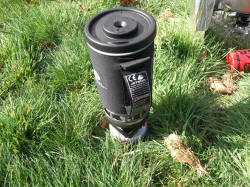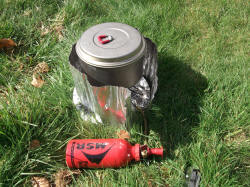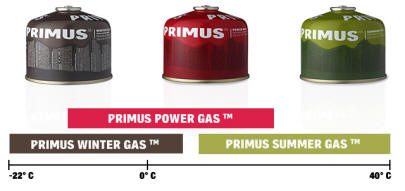

Stoves
There are many alternatives to the Primus Eta we use, some are:
Jet Boil. Very efficient runs on gas, but unstable and struggles with boil in the bag meals. Can boil over and has poor gas control. If not used with stability legs it is very easy to knock over. A 100g gas canister fits inside the pot. These have been updated over the years but they are still very tall and potentially unstable, while the pot is almost too small for a boil in the bag packet.
Primus
Modern versions of these stoves are very efficient, with good windshield and a heat exchanger on the pans. Carrying an additional windshield, such as the foil one from MSR (se photo above) or a fold up type can improve this further. Remote canister stoves are the most stable, being a lower profile and also allows shaking of the gas canister without disturbing the stove itself. This also has an advantage in that the canister can be placed on an insulator of some sort and kept off the ground. This could be important in freezing conditions.
Liquid fuel stoves such as MSR Whisperlite or Primus Omnifuel, etc. These can be messy and are usually heavy. There is a significant risk of fuel seepage when setting up and putting away, and also when refilling. They can also create a lot of dirty soot from the starting process if using paraffin or diesel. Stoves that use 'white-gas' which is a purified form of petrol are very effective and very clean. Providing suitable jets are fitted some will burn diesel and paraffin, and a few even container gas! A large fuel bottle will burn for up to 3 hours or so, while a smaller one about 1 hour. These are broadly equivalent to a 250 or 100 gas cartridge. Liquid fuel stoves work well in low temperatures, well below freezing. The fuel bottles have to be pressurised with the built in pump.
Gas systems typically use a 250g or 100g screw fit cartridge. The butane/propane mix in gas cylinders doesn't work well in
cold temperatures and needs to be kept warm (in your sleeping bag overnight).
A 100 cartridge will run reliably for about 30mins and up to nearly an hour,
though the last 15 mins or so are feeble and even worse in cold weather. A 250 cartridge will run for
about 2.5hrs and is suitable for a 2 or 3 day (or if frugal even longer) expedition. In cold weather
additional canisters should be carried. Freeze dried meals only require a single
boiling of water, unlike 'boil in the bag' which may need to be heated for up to
10 minutes continuously, though it is not necessary to burn at a boil for this time, turn it down to a simmer
and it will save a lot of gas.
Primus offer 3 grades of gas :-
Summer Gas best between 15°C and 40°C,
Power Gas best between -15°C and 25°C,
Winter Gas, best between -22°C and 10°C.
Each of these has varying mixes of Butane, Propane and Isopropane. Other makes include Coleman, Optimus, and MSR. Generally the lower temperature versions will have higher proportions of propane as butane does not vapourise below about 1 or 2°C. Power Gas is the most versatile blend, delivering excellent power even around zero degrees Celsius. Summer Gas is optimized for maximum fuel efficiency in warmer conditions. For cold temperatures Winter Gas is obviously best and works effectively down to -22°C. We do not advise the use of Summer Gas in Scotland as temperatures early and late in the day even in summer are rarely if ever as warm as 15°C.
Recent experience with modern stoves has shown that a single 250g canister has lasted for a 3-night/4-day expedition, mainly using freeze dried food, with enough left over for about another overnight trip! However, colder weather, or boiling more water for drinks or to sterilise may use considerably more. It is always wise to carry a spare canister.
If you are relying on melting snow or ice for water in winter or cold conditions you should plan on using at least twice as much fuel as normal. Melting snow can be tricky and damage your pans. Either start off with some water in the bottom or carefully melt some ice before putting large quantities in. It is important to take your time and not overdo the heat. Boiling water in very cold conditions also results in a lot of water vapour and steam.
If you are using a stove with a built in igniter, these have been known to fail so carrying a cigarette lighter or other means of creating a spark are essential.
Trangia meths stoves have a good reputation though can be bulky. They are easy to use, but filling and emptying can be hazardous, they are difficult to control and also slow. Meths is highly volatile (like petrol) and the smell from a leak can permeate through the rucksack. The flame from a meths stove is all but invisible so it is essential that care is taken to make sure it is out before re-filling or packing.